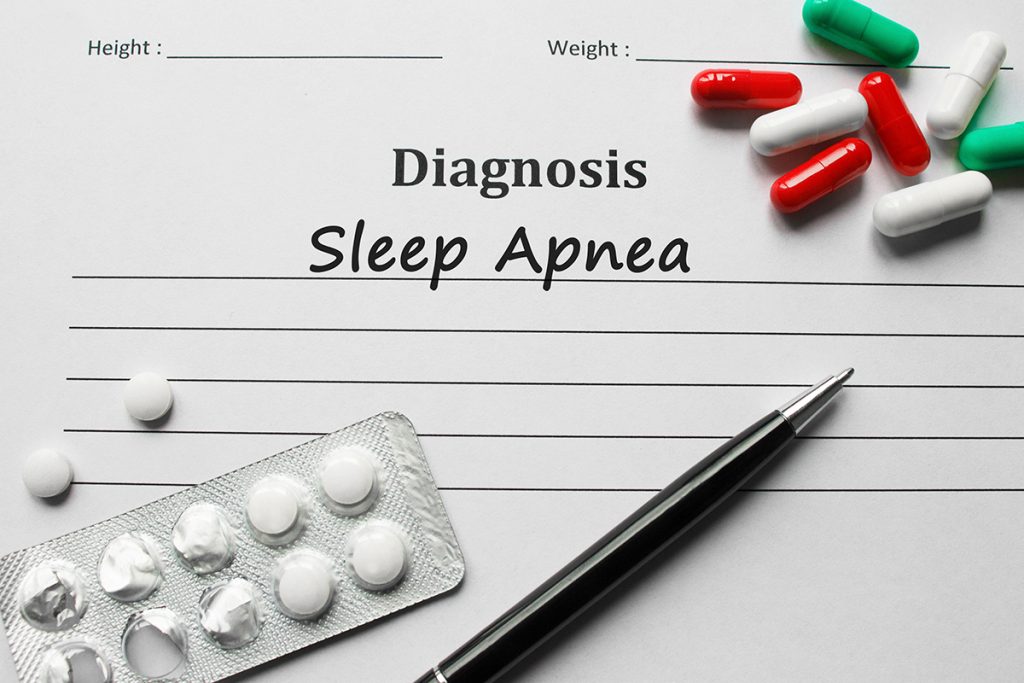OSA and Driving
How does OSA affect driving?
If a person is waking up hundreds of times a night, they are likely to be sleepy during the day. This is why some patients with untreated OSA are reported to fall asleep in meetings or in front of the television. If the person falls asleep behind the wheel of a car, it is clearly extremely dangerous.
It is believed that drivers with untreated OSA are up to ten times more likely to have a road traffic accident, and these accidents are likely to be of increased severity as driver reactions are slower. There are many reported cases of fatal accidents involving drivers with untreated OSA.

What should I do if I think I may have OSA?
We suggest that you make an appointment to see your GP. You should tell him or her about the symptoms and ask to be tested for OSA.
It is highly recommended that you are honest with your GP about your symptoms. In addition to the driving implications, untreated OSA can have major health consequences and it is believed that those who do not get treatment are likely to reduce their life expectancy by around 20%.
If your GP feels that it is possible that you have OSA, you should confirm whether or not you are able to continue to drive. This will depend on whether you think any sleepiness is having an adverse effect on your driving.
If your GP advises you not to drive because of sleepiness, and you are worried about losing your job, you should refer him or her to the NICE Clinical Knowledge Summary on OSA which advises GPs that…
“For adults where there are concerns about job security, ensure through personal communication with the sleep unit that diagnosis and treatment can be completed within four weeks of referral”.
https://cks.nice.org.uk/obstructive-sleep-apnoea-syndrome#!scenario
If I have OSA, when do I have to contact DVLA?
In October 2017, the DVLA updated its guidelines on driving and OSA. The new guidelines say:
The DVLA is only concerned with OSA when there is ‘excessive sleepiness having, or likely to have, an adverse effect on driving’. Therefore:
OSA diagnosis with excessive sleepiness having, or likely to have, an adverse effect on driving
- If you have a diagnosis of OSA with ‘excessive sleepiness having, or likely to have, an adverse effect on driving’, you need to let the DVLA know. It is strongly recommended that you write to the DVLA rather than call or email. In this way, you retain your licence and providing you comply with the treatment, in most cases your symptoms should be under control by the time the DVLA process is completed.
- In the meantime do not drive until your consultant says that you are safe to do so.
- Once you hear from the DVLA, comply with their instructions. They will ask you to complete an SL1 form which can be found on their website and they will ask your GP/consultant for information. In the meantime, your treatment will be ongoing and the symptoms controlled.
OSA diagnosis without excessive sleepiness having, or likely to have, an adverse effect on driving
- Those with OSA who do not have ‘excessive sleepiness having, or likely to have, an adverse effect on driving”, do not need to stop driving before treatment takes effect and there is no requirement to let DVLA know.
Suspicion of OSA without diagnosis
- If there is only a suspicion that there is might be OSA with sleepiness adversely affecting driving, you should stop driving because of the sleepiness, but do not need to notify the DVLA for three months or until a firm diagnosis of OSA with ‘excessive sleepiness having, or likely to have, an adverse effect on driving’ is made.
- If a diagnosis of OSA is made within the three months, you should follow the guidelines for OSA with sleepiness.
This process is applicable to both Group 1 and Group 2 drivers.
If in any doubt, speak to your consultant and refer them to the British Thoracic Society Guidelines on OSA and driving.
https://www.brit-thoracic.org.uk/standards-of-care/quality-improvement/sleep-apnoea/
What do I need to do once my consultant says that I’m safe to drive again?
As soon as your consultant says your condition has been controlled, you can start driving. This is straightforward if you gave up driving voluntarily as you will still have your licence. Although it is suggested that you let the DVLA know that you had OSA but that your symptoms are under control and that your consultant has given you the all-clear.

If your driving licence was revoked (which should not happen if you follow these guidelines), you will need to reapply for a licence before you begin driving again.
In both instances, once you start driving you need to ensure that you continue to comply with your treatment. If you don’t your symptoms will return and you will have to stop driving again until they under control.
Will I need to continue to update the DVLA that I’m fit to drive?
For Group 1 drivers, compliance with treatment and ongoing symptom control must be assessed by your sleep clinic on a three-yearly basis. For Group 2 assessment is required every year.
At the point of going to press, we are not yet clear how this will work but this document will be updated once we have more information from the DVLA.
How does OSA affect my insurance?
Advice provided by the Association of British Insurers (ABI) states that there should be no effect on insurance premiums for drivers who have been diagnosed with OSA where any resulting symptoms are being controlled through treatment, providing you have informed the DVLA and they are satisfied that you are fit to hold a licence.
For those with treated OSA, there is no insurance penalty, premiums will not be loaded and any accident claims will be treated in the normal way.
However if you have an accident and are found to have undisclosed OSA with ‘excessive sleepiness having, or likely to have, an adverse effect on driving’, you may find that your insurance company will not pay your claim as your insurance is invalid.
It is advisable to check whether your personal or employer’s insurance policy requires you to declare medical conditions to avoid any claims being denied.
What responsibility does my employer have?
If you drive a company vehicle, your employer has a duty of care to ensure your safety and that of the general public. Therefore it is important that you inform your employer at the earliest opportunity that you are being treated for OSA, so that if you are unable to drive while undergoing treatment, your employer is better placed to discuss your options.
It may be helpful to mention that fast-tracking is available for vocational drivers in many sleep centres as your employer may be asked to confirm to your GP or consultant that you depend on your driving licence for your job. Also if your employer knows that you are being fast-tracked, they may be able to find a non-driving role for you until you are safe to drive again.
Additional information on OSA and driving:
http://www.sleep-apnoea-trust.org/driving-and-sleep-apnoea/
DVLA UPDATE ON DRIVING REGULATIONS FOR OSA
If you are a driver with symptoms of OSA or a fleet operator unclear of the implications for drivers, please read the following explanation of the new DVLA guidance for Assessing Medical Fitness to Drive.
Following discussions with the DVLA relating to the requirements for driving with OSA, there have been some changes to the guidance provided for medical professionals when assessing whether a patient should drive and or whether they should contact the DVLA.
Information for drivers
These changes mean that if a driver is diagnosed with OSA, but does not have excessive sleepiness having, or likely to have, an adverse effect on driving, they may continue to drive as normal and do not need to notify the DVLA.
If a driver has sleepiness that has an adverse effect on driving, and it is suspected that they might have OSA, they should stop driving but do not have to notify the DVLA until a diagnosis has been confirmed.
However, if OSA causing excessive sleepiness, that has an adverse effect on driving, is confirmed by a sleep clinic, the driver must stop driving and must notify the DVLA. If they have already been treated, and the symptoms have resolved, then the DVLA should not revoke their licence.
Sometimes the term OSA syndrome (OSAS) is used to mean OSA plus symptoms, usually sleepiness. The DVLA however are only concerned about symptoms that adversely affect driving (i.e. sleepiness).
You may see references to AHI (Apnoea/Hypopnea Index). This is a measurement that is referenced in the DVLA guidance. However the central focus for a medical professional in making an assessment should be based on excessive sleepiness and whether it has an adverse effect on driving.
If a driver falls into one of the categories above where the DVLA needs to be informed, we recommend the following steps:
- If they are a professional driver, who relies on their driving licence for their livelihood, we recommend that they mention this to their GP and ask that the GP contacts the local sleep centre to request fast-tracked treatment within four weeks. https://cks.nice.org.uk/obstructive-sleep-apnoea-syndrome
- Once OSA has been confirmed as the cause for sleepiness adversely affecting driving, regardless of whether the driver is a type 1 or a type 2 licence holder, we recommend that they write to the DVLA (rather than calling the helpline number or using the online facility). The DVLA will send form SL1 or SL1V and this should be completed and returned. In the intervening time, the driver must stop driving and start the recommended treatment.
- Once this treatment is successfully controlling the symptoms, and the sleep unit has confirmed this, driving may start once again. Therefore on the form the DVLA sends (SL1 or SL1V), the driver can say the condition is controlled (tick the ‘yes’ box in 1.3) and there will be no need to withdraw the licence. As long as they comply with the treatment and the sleepiness resolves, the driver’s licence will not be affected.
“We are very aware that for vocational drivers, quick access to treatment can make the difference between an individual either deciding to seek help, or deciding on the alternative of continuing to drive because they are fearful they will lose their licence, and thus their livelihood”.

How to Get Involved
We welcome support, particularly from healthcare professionals, politicians and Government officials and the logistics industry.
 Follow us on Twitter
Follow us on Twitter
Visit our Twitter page to find out all of the latest goings on in the OSA world. Make sure to follow us to keep bang up to date..
 Like us on Facebook
Like us on Facebook
Along with our new Twitter feed, you can also visit our Facebook page for more OSA news, links and useful information.
Contact Us
To find out more about the OSA Partnership Group, contact:
Gillian Gibbons
gillian@wychwoodcommunications.com
m) 07795 342804


